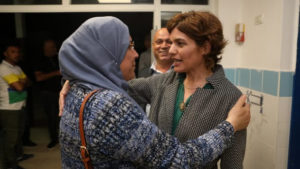Israel Election: Arab Votes Saved Meretz, Party Chairwoman Says

Meretz Chairwoman Tamar Zandberg greets Arab voters in Kafr Qassem on Election Day, April 9, 2019
It is difficult to say if this was a good election for Meretz. According to the unofficial results on Thursday, the party had shrunk to four seats and the hope of joining a center-left coalition under Benny Gantz had vanished as if it had never existed. But Meretz chairwoman Tamar Zandberg views the results as a real achievement.
“I heaved a sigh of relief,” she told Haaretz on Wednesday. “There was a tsunami of voters for Kahol Lavan and we survived it.”
Late in the afternoon on Election Day at a polling station in the Graetz School near her home in Tel Aviv, Zandberg began to realize something was wrong. A wave of voters shifted away from Meretz to Kahol Lavan. At the same time, Zandberg says, text messages began arriving from Meretz activists at other polling stations reporting the same thing. “We immediately began a brutal ‘save us’ campaign.”
>> Read more: What happened to the once dominant Israeli left? ■ How Gantz may end up erasing the Israeli left | Analysis ■ Without addressing the most important issue, the Israeli left will continue to lose | Analysis
When the vote count began, it turned out that a significant portion of Meretz’s base had abandoned it in support of Benny Gantz. The blow struck Meretz in its traditional strongholds around the Tel Aviv metropolitan area.
In relative terms, Labor was hurt even worse: In Tel Aviv and Jerusalem Avi Gabbay’s party received fewer votes than Meretz. “The left was erased by Kahol Lavan,” she said.
The Arab community provided a lifeline for Meretz: One of the four Knesset seats came entirely from Arab voters, pushing them above the electoral threshold. The party received significantly more Arab votes in this election than in the previous one in 2015. 8,000 of Meretz’s votes came from Druze towns. The Arab community has finally returned to Meretz after a rift that began following the protests and riots of October 2000.
“We had 12,000 votes in Arab communities in the previous election and another 2,000 to 3,000 in mixed [Arab and Jewish] cities. This time we won 35,000 votes in Arab towns and in total almost 40,000,” said Zandberg.
The placement of Esawi Freige, an Israeli Arab, and Ali Salalha, a Druze, in the fourth and fifth places, respectively, on their Knesset slate was significant in winning back Arab voters.
Meretz is building a political asset from this partnership, Zandberg said. “From now on the left must base itself on it in a more important way. On the political and electoral level, if the center-left camp does not create partnerships with the Arab community, it will not be able to return to power. If the Arabs vote like the Jews, there won’t be a prime minister from the right,” she said.
Gantz lost the Arab vote when he promised to establish a coalition with “anyone who is Jewish and Zionist,” she said. His attitude toward the Arab community seems to be what made him the head of the opposition and not the prime minister, she added.
When she was elected to lead Meretz, Zandberg set an ambitious goal of 10 Knesset seats. In reality, she had a hard time exciting voters in recent months, but identified new groups of potential voters – worth up to five seats – and invested heavily in convincing them.
In the end, this is what saved Meretz, said a party official, because they brought in new voters to replace its traditional base, many of whom voted for Kahol Lavan.
Zandberg has made it clear that she is not resigning as party leader. She was also convinced on Wednesday that the soldiers’ votes would give Meretz a fifth Knesset seat, reaching the number it had in the outgoing Knesset, and initial reports from the Central Elections Committee seem to confirm this.
This article appears in its entirety.
